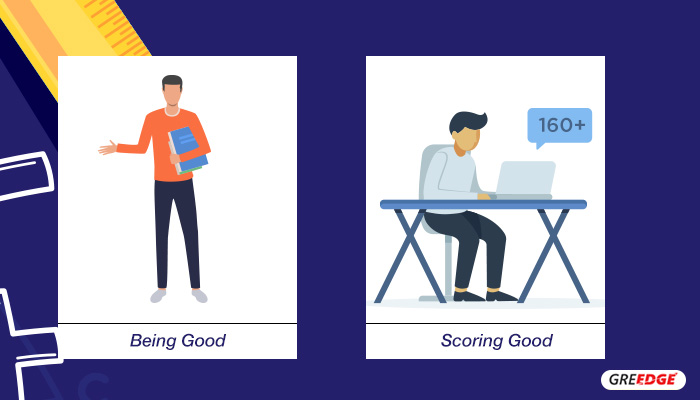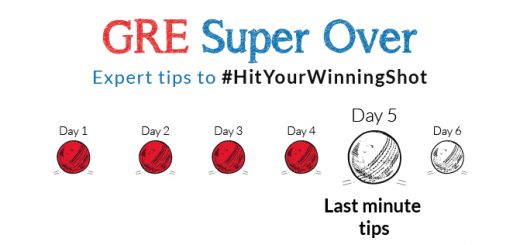How to get GRE Quant Score of 160+?
160+ GRE Quant score is not unheard of.
It is quite possible.
Out there, there will be no dearth of scintillating toppers with a grand GRE Quant score. But the question that remains is: how did they manage to achieve it? Do you think there is some magic here? What is the sleight of hand they employ that you don’t?
Imagine a novice typing something on a keyboard using two fingers and compare him with a professional typist whose fingers literally fly over the keyboard. Picture the grace and fluency that a professional has. By constantly honing his skills in typing, he has mastered the art of using the right fingers for pressing the right keys. And, his confidence in the job makes him look near-perfect. Much in contrast to the novice who would take some minutes just to type his/her own name.
For all we know, the novice works harder to type with two fingers than the professional. But how far do his results take him?
Now, we have all heard of the “practice, practice, practice” rhetoric.
Yes, there is practice and much more!
Check out the “Quants handbook for a perfect 170 score“
Being Good vs. Scoring Good

So you are good at Mathematics?
That’s great, but does it really help you in improving your GRE Quant score?
It’s not easy to get the GRE Quant score of 160+. It’s an online adaptive exam that ‘adapts’ to your level of competency. That is, the successive sections get harder or easier based on the performance of your previous section. You do not get the leisure of pondering over a problem since you would be expected to solve approximately 20 questions in 35 min. Spending a long time on a tough question will make you run the risk of losing out on an easier question later on.
So being good at Quant will not suffice, unless you are exceptionally good.
Scoring good in the GRE Quant section is what matters, and that would take good GRE Quant preparation.
The Challenge of GRE
GRE is not just a test of competency. It tests applicants on their time management skills and adaptation skills to face challenging scenarios. So solving a problem is not good enough. Solving it fast is what would give you an edge over the other applicants.
That edge might push you into the league of 40% of the test-takers with GRE Quant score above 160.
But how about getting into the 23% league of elitists with GRE Quant score 162–166? Surely immaculate time-management skill is not the only ace up their sleeve.
Let’s explore a bit more.
For starters, do you know what the four sections are in GRE Quant section?
Preparation: Knowing what to expect.
The only way to save yourself from not falling into despair in the middle of preparation is by knowing the type of questions that you can expect in the GRE exam. A proper scheme of plans and strategies will definitely be the X factor to help you push the borders.
The challenge starts with this topic:
Arithmetic:
The arithmetic section would involve questions on properties and types of integers, arithmetic operations, exponents, and roots. Concepts on estimation, percent ratio, rate, absolute value, number line, decimal representation, and sequence of numbers would be your hosts in the GRE exam.
Algebra:
Algebra topics would include operations with exponents, factoring and simplifying algebraic expressions, relations, functions, equations, and inequalities. You would be expected to solve problems on linear and quadratic equations and inequalities. Also, there would be problems with simultaneous equations and inequalities.
Geometry:
Geometry for conceptual thinkers would include challenges from parallel and perpendicular lines, circles, triangles, quadrilaterals, and other polygons. Congruent and similar figures, three-dimensional figures, area, perimeter, and volume would be in the list. And lastly, problems from the Pythagorean theorem and angle measurement in degrees.
Data Analysis:
Data analysis ranges from basic descriptive statistics such as mean, median, mode, range, standard deviation, interquartile range quartiles, and percentiles. This section would also ask you to approach problems from interpretations of data in tables and graphs, elementary probability, permutations, and Venn diagrams.
Now that you are familiar with the problems, let’s look at the solutions. Let’s begin by looking at what you can do about them, optimally.
Download the eBook on “160+ in GRE Verbal“
What 160+ scorers do: Closing the gap
There is no insurmountable wall between you and a good GRE Quant score of 160+. It is not rocket science. There is no magic and certainly no wonders. When you walk into the exam room on the test day, you know you’d have nothing but a GRE Quant score above 160 and the results would just reflect your confidence. Even if you have a little doubt about things going wrong, then things would go wrong. So start now, start strong, and improve your GRE Quant score.
Start with the Basics
We might have been proficient with the basics of math in our high school. But time turns and makes everyone rusty when we don’t practice them much. Basics of arithmetic are often overlooked by a lot of people who try to work on finesse without getting the foundation right. Such students can find it very challenging to improve Applied Math and Data Interpretation since they hit a roadblock. Because, for these topics, flawless conceptual knowledge in basic arithmetic is a prerequisite.
Skipping Steps
Deviating from the established procedures can lead to a disaster. The small steps that are skipped in the calculations to save time come back as low scores, often due to silly mistakes and a bag full of regrets. Avoid these to improve your GRE Quant score.
The Lure
Try this question:
Question: Given 3a is an even number
Quantity A: a
Quantity B: 2a
Which of the following options is correct:
1. Quantity A is greater
2. Quantity B is greater
3. The two quantities are equal
4. The relationship cannot be determined from the information given
Did you go for the 2nd answer?
Congrats! You just got baited and your temptation to quickly mark a right answer has cost you the perfect GRE Quant score.
Getting lured to the wrong options in multiple-choice questions can also be an indirect result of the former. Options are designed to replicate wrong answers which are often the products of the most common mistakes students make.
Inadequate practice essentially breeds low confidence. With low confidence comes anxiety, fear, and low motivation. You cannot expect to run on the tracks of this race with such weights attached to your back. Students with low confidence and low motivation end up wasting a lot of time. In the end, anxiety ruins the entire scenario.
(P.S. The explanation and the right answer is posted at the bottom of the page. Find out where you went wrong. Scroll down!)
This tip Never gets old!
Being prompt on plans and being regular with practice is the tried and tested solution to this problem. Not only does it bring out the weaknesses that you need to polish, but also slowly settles you into the scenario of time-bound testing. Challenge yourself constantly and ensure that you achieve accuracy all the time. Try to bring up the dropping curves of your performance graph to a consistent straight line. 160+ GRE Quant scorers do well consistently in all spheres of the pattern. Overlooking the weaknesses you have can leave serious dents in your GRE Quant preparation that you might find harder to mend in the later stages.
Ease your pressure
Leave no stone unturned when it comes to GRE style mocks. Buck yourself up to reduce pressure, by solving under the clock. After all, in the examination, you get no more than 1:20 min to solve a single question. You could be running short of time towards the end if you are not alert to the time factor from the beginning. The more number of practice tests you take, the more accustomed you get to face all these problems.
Problematic DI
Speaking of question lists, it’s advised to attempt Data Interpretation questions at the end. DI is known to baffle students with tricky questions. The dominating panic of getting a question wrong after spending a minute or two on it can adversely affect the chances of getting the other questions right.
Don’t let the easy correct answers suffer.
Exam time follies
Lastly, organize your rough sheet/scratch paper. Number the calculations and make proper and efficient use of the rough space.
When the clock’s ticking, it can be very hard to focus on the organization.
The last thing that you would want to happen in your rough sheet is the ‘6’ of Q.5 mixing up with the ‘66’ of Q.6.
How confusing will that mess be?
But, what are the solutions for all these problems?
No Sermons : You need Proper Advice

It is true there is information everywhere today. But there is always a trade-off which, in this case, is quantity over quality. The aspect of authenticity has been drowning in the depths of opinions and sermons since the time the Internet was born. Finding relevant information suddenly became very hard. Compilation of tips for scoring 160+ was found wanting when a lot of information was thrown about without valuable insights from a teacher.
It took some time to track down one such SFA (Student Facilitator Analyst) responsible for the success stories of many students. It took even more time to insist on a one-on-one Q&A with him but he eventually agreed. We had a discussion and here is the crux of it:
Q. What percent of students have a GRE Quant score above 160?
Around 40% of people who take the GRE exam have a GRE Quant score above 160. The numbers go higher during Jun–Jul. Since people with good insights about their GRE prep give the exam during this time, and they start preparing with us months earlier. They know about their weaknesses and have worked a lot to rectify them. So their results are obviously better.
Q. What part of the Quant syllabus do you think most students are weak in?
By far, Probability Distribution questions seem challenging to most of our students. Their weaknesses become evident in the revision tests and the GRE style Quant tests they take. So, it does not come as a surprise when we find that their scores dip in PD and DI in the practice sessions.
Q. What part of the GRE exam do you think students lose most of their marks in?
So there are questions that have more than one answer. Students find them confusing and they make a lot of mistakes. Also there are numeric entry questions which require students to enter a precise numerical value. Since these types of questions do not have options and require a high degree of precision from the student’s side, a lot of mistakes are committed. Also, topics such as Applied Mathematics and Venn diagrams trouble students the most. That is where they lose their GRE Quant scores. If they practice adequately and focus on their time-based accuracy, I’m sure they can overcome this.
Q. What do you suggest to the people who aspire to break the 160 barrier?
We can gauge the competency level of the student when he joins us and gives the diagnostic test and review tests. The stats speak for the student. We can estimate the student’s GRE Quant score over blurry lines. Sometimes, we are happily surprised. But more or less, the advice stays the same – whether it is a 160 or 150 student.
First, conceptual knowledge. Without that, aggressively preparing for other parts can be ineffective, since sooner or later we have to come back to the basics again.
Second, application of concepts. Learning concepts is what we can help our students with, but the application has to be taken care of by the students by relentless practice under time constraints.
Third would be accuracy. Time management has always been a core part of GRE preparation. But time management cannot come in lieu of accuracy. Accuracy is useless without time management, as is time management is without accuracy. Getting an answer right is not a big deal. Getting it right under constraints of time and overwhelming exam pressure can be difficult. For us, that is the concept of accuracy.
Q. Do you think that GRE, being an online test, hampers the ability of the student to score well?
Yes, of course. Not many of us are acquainted to the online platform of education. And GRE is no normal test. For one, applicants pay a lot to sit for the exam, and on top of it their dream of achieving big depends on their success in this test. Students complain upfront about the inconvenience of taking the test online. Something as simple as turning pages to find the review questions by clicking buttons also becomes a point of concern. While all of this might sound very easy even to a seasoned user of computers, under the pressure of a ticking clock small things like this can become a big problem. Also the places where you are supposed to use a calculator that is provided by fighting the urge to calculate manually, is something that a student must master. So being comfortable with the online platform is a big issue. Preparing online will help.
Q. What is the ideal number of mock tests you would recommend before taking up the final exam?
The more the better! About 8 to 9 mock tests should do the trick for Quant. Priority should be to get used to the conditions. And, maintaining accuracy without worrying about time.
Q. What score do you think is a good indicator of 160+ GRE Quant score in our AdmitEDGE Quant test?
Ideally 30, but someone is yet to achieve that. It is seen that people who manage 28 or 29 in our review tests consistently, go on to secure a GRE Quant score of about 160 and above.
He went on to show me some stats from the Learning Tracker. And it indeed was congruent to what he said.
Here are the stats of AdmitEDGE students and their accuracy on questions of different difficulty level. Have a look at their AdmitEDGE Learning Tracker Stats :
Fig 1.2: Performance Accuracy on Easy, Medium, and Hard Questions
This graph shows scoring patterns of students on difficulty levels easy, medium, and hard questions of AdmitEDGE. 166–170 GRE Quant scorers had a scoring accuracy of nearly 56.30% on difficult questions and 85.51% scoring accuracy on easy questions. Have a look at the yellow pillars and realize how they stand tall against the others.
Summarizing: What is your take away?
But before that as promised,
The explanation of the questions shown above awaits you!
We know that Odd × Even = Even.
For 3a to be even, a must be an even number
a = 0, 2, 4, 6, 8, ..
For a = 0, the two quantities are equal
For a = 2, 4, 6 quantity B is greater.
Therefore, the relationship cannot be determined from the information given.
If you had chosen option b, then you might not have taken a = 0. Remember, 0 is also an even number.
No doubt that we all start off by typing with two fingers. But some found the time to practice the right way. They stumbled countless number of times but their persistence to do it right took them places. They were not adamant and they learned from their mistakes. Their methods were simple but organized. And as tempting as it was for them to deviate and cut corners, they did not. When the chips were down, it was their self-confidence that motivated them to perform better.
Perhaps, that is why they type so flawlessly today.
Perhaps, that is why they scored 160+ in GRE Quant.
Do you think you can do it?
Absolutely, you can!
Start the journey towards change today. Take our free GRE Score Predictor Test and know where you stand.
Happy Learning!









